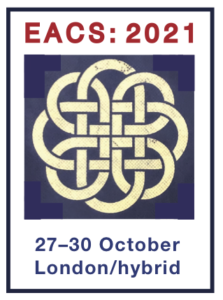HIV-specific mental health services across the EU
30 November 2021. Related: Conference reports, Coinfections and complications, EACS 18 London 2021.
 Simon Collins, HIV i-Base
Simon Collins, HIV i-Base
One of the community sessions at EACS 2021 included a panel discussion on HIV and mental health issues – perhaps better referred to as mental quality of life – including services provided by HIV clinics and organisations in the WHO European Union.
This was informed by results of a cross-sectional survey run by the European AIDS Treatment Group (EATG) during October-November 2020 that was distributed online in seven languages.
There were 646 individual responses (389 from inside the EU/EEA) and 241 organisation responses (187 from the EU/EEA) and results were presented for the individual responses. Respondents were educated (85% with high school education), urban (56%), employed (57%) – who would generally be able to negotiate health services. Median age was around 45 years and roughly 52% were heterosexual.
Roughly half reported symptoms linked to depression, (increasing from 40% before diagnosis to 58% after) and half had never been assessed for mental health. Most people reported that HIV negatively affected their mental health, including during COVID-19. Most reported support from family and friends rather than an HIV organisation (13%) or HIV clinic (11%).
Although the presentation didn’t report the degree to which needs were matched by services, the full results are available in a 60-page report. [2]
Community workshops organised to develop issues raised in the survey focussed on the importance of developing HIV-specific non-judgemental mental health services with clear and easy referral pathways, and these recommendations have been summarised in a short online report. [3]
This included the need to develop different services for different risk groups, including sex workers, gay men, injecting drugs users and older people, as models developed for one group often were less relevant to others.
The following panel discussion, including clinical responses from western and eastern EU countries was important, for an easy to engage dialogue about how unrealistic it is for such services to be easily developed for 50% of HIV positive people with background symptoms of depression, not least because most doctors are neither confident or trained in this area. Mental health are not always obvious and when identified usually involve intensive interventions over time.
Services vary between countries but many HIV services do not include psychological support and appointments for screening also need to cover the whole range of ongoing clinical assessments. Plus HIV positive people are getting older, often are becoming isolated and lonely.
EACS guidelines recommended simple psychological screening (historical, baseline and then annually) based on two questions: (i) Have you often felt depressed, sad or without hope in the last few months? and (ii) Have you lost interest in activities that you usually enjoy?
Diagnosis involves regular assessment of 7 key symptoms, including weight loss, fatigue, insomnia and aspects of self-worth. Management interventions require at least 4/7 symptoms when antidepressants can be considered, but expert referral is only recommended with >6 symptoms.
The discussion also used the example of chemsex-related mental health issues where specialised professional services are not commonly available in most countries – and where cases of such extreme psychosis are beyond most doctors experiences. Often the most successful responses can be linked to community developed services with peer support. Similarly, migrant women have a very different pattern of mental health services that demand similarly culturally appropriate services. This involves developing new services at a time when current budgets are being cut.
Criminalisation of key populations, or activities that are common in key populations means that people are lost to mental health care – and make it essential that people living with HIV are involved in developing appropriate services.
A recent UK report included that nearly 40 per cent of HIV clinics do not have access to a psychological or mental health professional even though people living with HIV are twice as likely to have mental health issues compared to the general population. [5]
In practice, the demand for services often means that people in the UK in critical need of support often face delays of weeks, or more likely months, before a specialised referral. GPs likely to prescribe antidepressants which may or may not be appropriate.
References
- EATG community session. Mental health and access to mental health services for people living with HIV in the WHO European Region – Recommendations for the healthcare sector.
https://eacs2021.abstractserver.com/program/#/details/sessions/109 - Survey Report: Mental Health of People Living with HIV and Staff of Organisations Working in the Field of HIV in the WHO European Region. (June 2021).
https://www.eatg.org/wp-content/uploads/2021/06/eatg-hiv-and-mental-heatlh-survey-report-english.pdf (60-page PDF report). - Briefing Paper: Mental Health of People Living with HIV. (21 October 2021)
https://www.eatg.org/publications/briefing-paper-mental-health-of-people-living-with-hiv (download page)
https://www.eatg.org/wp-content/uploads/2021/10/eatg-hiv-and-mental-heatlh-briefing-paper-english.pdf (3-page PDF report) - EACS guidelines, versions 11, pages 96-104. (October 2021).
https://www.eacsociety.org/guidelines/eacs-guidelines (download page)
https://www.eacsociety.org/media/final2021eacsguidelinesv11.0_oct2021.pdf (PDF) - APPG HIV. The Missing Link: HIV and Mental Health. (March 2020).
https://www.appghivaids.org.uk/news/2020/3/4/press-release-mental-health-services-failing-patients-with-hiv (download page)
https://static1.squarespace.com/static/5b7d333855b02cc3853805ce/t/5e60ec83633a0705fb4d4a32/1583410309413/The+Missing+Link+Web+version.pdf (60-page PDF report)

